Literature
TLALAATALA
Jose Luis Castillejo (1930-2014) described himself as a "modern writer". In 1969 he self-published The Book of I's, which was a book that consisted entirely of the letter 'i', printed repeatedly on several hundred pages. He said that he wrote it to "end the torrent of words we call literature." It's read below by Fernando Millan. (He begins reading the book shortly after the 1-minute mark).In 2001, Castillejo explored the letters T, L, and A, with his release of TLALAATALA. It's read again by Millan.
As you might guess, writing wasn't Castillejo's day job. He earned his living as a diplomat, serving as General Consul of Spain in Stuttgart, as well as Spanish ambassador to Nigeria and Benin.
More info about Castillejo: caac.es
Posted By: Alex - Fri Dec 11, 2020 -
Comments (3)
Category: Literature, Books
The Quest For A Blonde Mistress
Publisher Emanuel Haldeman-Julius debuted his "little blue books" in 1919. These were cheaply bound, pocket-sized literary and academic works designed to make highbrow culture accessible to the masses. They sold for five cents each.Haldeman-Julius didn't do this for charity. He wanted to sell as many titles as possible, and to achieve this he would often alter the titles to make them more appealing to consumers. Basically, he would sex up the titles.
For example, he added the subtitle "The Quest for a Blonde Mistress" to Theophier Gautier’s novel The Fleece of Gold. Sales leapt from 6000 to 50,000 copies a year. (Apparently, 'quest for a blonde mistress' is an accurate description of the book's plot.)
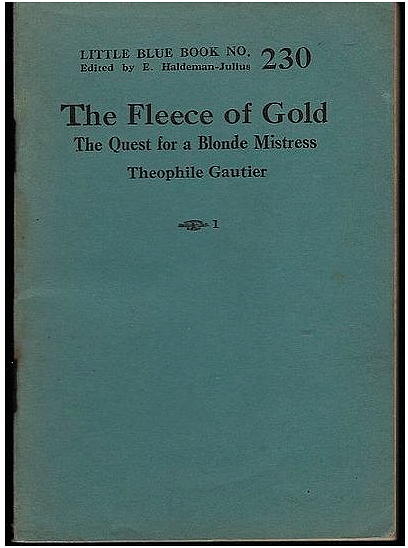
Other titles that benefitted from a title change:
• "The Tallow Ball" by Guy de Maupassant became "A French Prostitute's Sacrifice."
• None Beneath the King by José Zorrilla became None Beneath the King Shall Enjoy This Woman.
• Victor Hugo’s The King Amuses Himself became The Lustful King Enjoys Himself.
Haldeman-Julius didn't always make the titles more risque. Sometimes he emphasized self-improvement, and that also had a positive effect on sales. For example, sales of Thomas De Quincey’s Essay on Conversation jumped when it was renamed How To Improve Your Conversation. Similarly, Arthur Schopenhauer’s Art of Controversy became How to Argue Logically. And Dante and Other Waning Classics became Facts You Should Know About the Classics.
Haldeman-Julius was totally open, even boastful, about this strategy. From his book The First Hundred Million:
Posted By: Alex - Tue Jul 07, 2020 -
Comments (3)
Category: Literature, Books
James Bond’s Cigarettes
According to Ian Fleming's books, James Bond was a heavy smoker, consuming 60-70 cigarettes a day. By my quick calculations, that means Bond smoked a new cigarette about every 15 minutes.Bond was also loyal to a specific brand: Morland cigarettes. These were custom cigarettes created specifically for him by Morland & Co. of Grosvenor Street from a blend of Balkan and Turkish tobacco. They had three gold rings around the butt.
These were real cigarettes which one could buy, and which Fleming himself smoked. They were sold as the "James Bond Special No. 1". However, you can't buy them anymore since the company went out of business soon after Fleming's death.
More info: Fleming's Bond
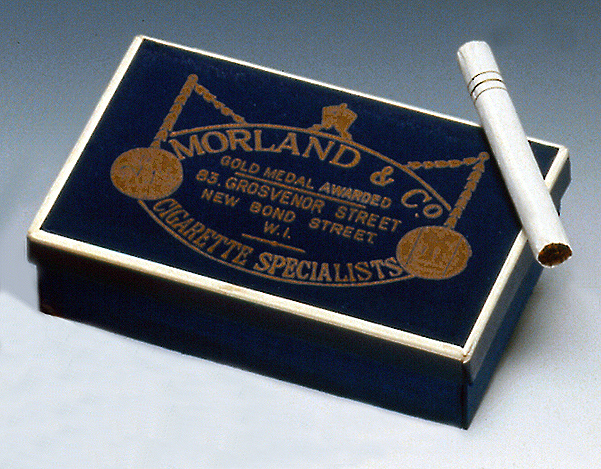
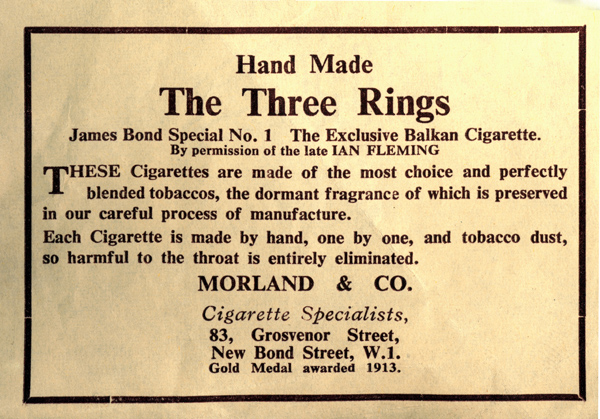
Posted By: Alex - Fri Jun 19, 2020 -
Comments (6)
Category: Literature, Smoking and Tobacco
1919 Cartoon “Hamlet”
Posted By: Paul - Wed Sep 04, 2019 -
Comments (0)
Category: Humor, Literature, Cartoons, 1910s
The Rockin’ Ramrods, “Don’t Fool With Fu Manchu”
Posted By: Paul - Sun Jul 07, 2019 -
Comments (1)
Category: Literature, Mad Scientists, Evil Geniuses, Insane Villains, Music, 1960s
No Frills Books
In 1981, Jove Publishing debuted a “No Frills” series of books. This consisted of four books, each of which was supposed to represent a generic version of a genre (science fiction, western, mystery, and romance). Each book featured a generic cover, styled after the generic packaging for foods.And to complete their genericness, the names of the authors weren't revealed. But the Internet, of course, has subsequently tracked down who they were. As posted on Bill Crider's blog:
Mystery was written by Clark Dimond, a men's mag editor/writer who also wrote for comics.
The Romance was written by Judy Coyne (former Glamour mag editor) nee Wederholt
The SF was written by John Silbersack, SF editor and now an agent.
The Western was by Vic Milan (SF author)
We were working on a No-Frills Besteller (by me) and A No-Frills movie (by film critic David Ansen) when the series was dropped.
My partner selling the series was Lou Rosetto who went on to found WIRED magazine.

So what were the plots of these 'generic' novels? Here are some summaries I was able to find online:
Science Fiction (via Goodreads)
"A space cadet is called to the commander's office at the moon academy. His father is the lone known survivor of the Pluto colony, and asks for his son to join him in the search for what happened. They assemble a crew and blast off to Pluto, where they stumble upon few clues but several surprises."
Western (via Goodreads)
"It begins when Kid Smith arrives in town and almost immediately finds himself in a bar room brawl. He’s soon menaced by the town’s two factions. Those wearing black hats are led by a corrupt judge and those wearing white hats are led ….by a corrupt mayor. Both want their hands on the widow West’s land but Smith has taken a shine to her and vows to protect her and her property from the two no-good skunks and their henchmen."
Romance (via NY Times)
'''Romance' is complete with everything the cover claims - a kiss, a promise, a misunderstanding, another kiss, a happy ending -plus an alarming trial marriage condoned, nay, arranged by the Mother Superior of a Virginia hunt-country convent."
Mystery (via Bill Crider)
"The story itself is pure pulp, with corpses piling up at an amazing rate. The unnamed first-person private-eye narrator is given a mysterious cassette tape. Someone's killing to get it because although to the p. i. it sounds like a song, it has the power to cloud most men's minds. Most women's, too. Whoever has the tape can control the world."
Posted By: Alex - Mon Jun 10, 2019 -
Comments (2)
Category: Literature, Books, 1980s
Masquerade Party
Here's what's really weird about this show: a poet, Ogden Nash, and an author, Ilka Chase, were not considered too highbrow for a game show, and were recognized by the mass audience. Try that today!
Of course, having Dagmar on the show did not hurt.
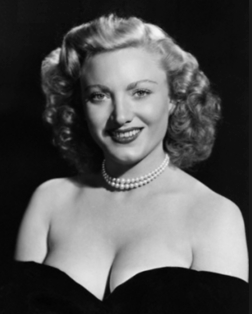
The other parts of this episode also on YouTube.
Posted By: Paul - Sat May 04, 2019 -
Comments (0)
Category: Awards, Prizes, Competitions and Contests, Celebrities, Disguises, Impersonations, Mimics and Forgeries, Games, Literature, Television, 1950s
Least Successful Author
William A. Gold of Australia had the dubious distinction of being named the least successful writer ever in the 1975 edition of the Guinness Book of Records. To my knowledge, Guinness never awarded this record to anyone else.Gold gained the title because, as of 1975, he had written at least eight novels and 100 short stories, but none of them had been published, despite his best efforts. His writing had only ever earned him 50 cents from an article published in the Canberra News.
I've only been able to find the titles of two of Gold's book. One of them was John Lewis Seeks a Mission, which he submitted to the Adelaide Advertiser $2000 Literary Competition in 1966. (Obviously, he didn't win.) The other was One Best Seller: A Satire on the Publishing Game. The Sydney Morning Herald described this as dealing with "the adventures of author Eric Bellamy, literary agent Lawrence Templeton, and the latter’s attempts to get Bellamy’s novel, Sibelius on Sunday, published." Gold eventually self-published this novel in 1984. (and it's available for purchase from some used book stores in Australia.)
Gold died in 2001, and his collected papers are now stored at the National Library of Australia.
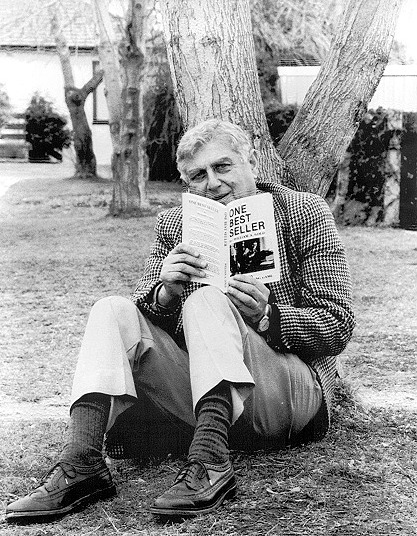
"23-7-87. Mr. Bill Gold, the world's greatest unpublished author, with his own published book, "One Best Seller." No one wants the book." (Getty Images)
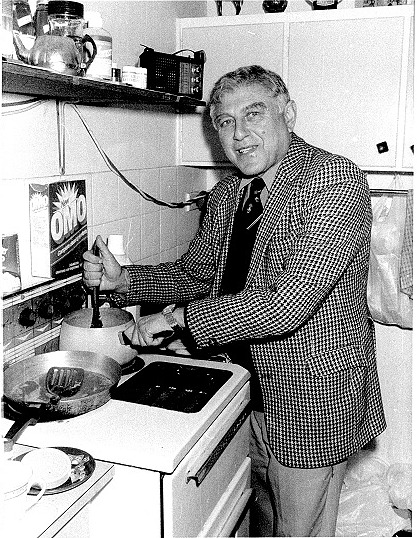
"23-7-87. I'm broke, give me ten dollars for two books. This was Mr. Bill Gold as he makes dinner in his small flat in Queanbeyan. He is the world's greatest unpublished author." (Getty Images)
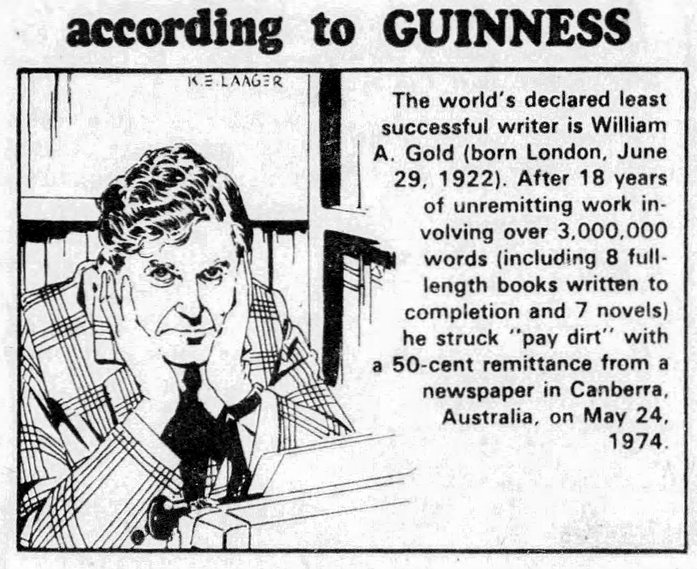
The Montreal Gazette - Feb 9, 1979
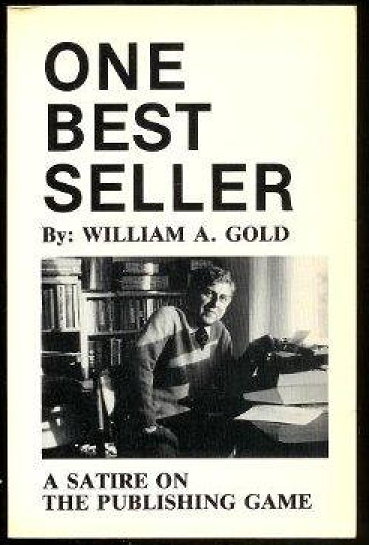
Posted By: Alex - Tue Feb 05, 2019 -
Comments (2)
Category: Literature, Books, World Records, 1970s
Allan Quatermain and the Lost City of Gold
I wonder what more-famous franchise inspired this turkey?
"Sharon Stone...was nominated for a Golden Raspberry Award for Worst Actress for this role, for which she lost to Madonna for Who's That Girl."
Wikipedia page here.
Posted By: Paul - Sun Nov 18, 2018 -
Comments (7)
Category: Ineptness, Crudity, Talentlessness, Kitsch, and Bad Art, Literature, Movies, 1980s
Abolish Women’s Fashions
The novelist W. L. George, deemed a feminist, wanted to abolish fashion and prescribe a universal uniform for all women, to save effort and money.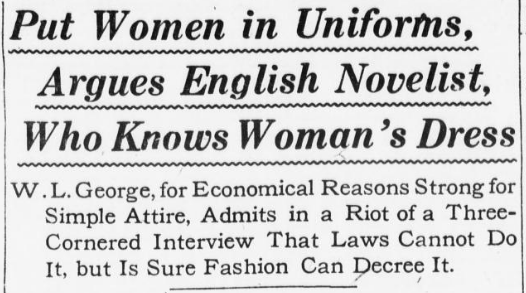
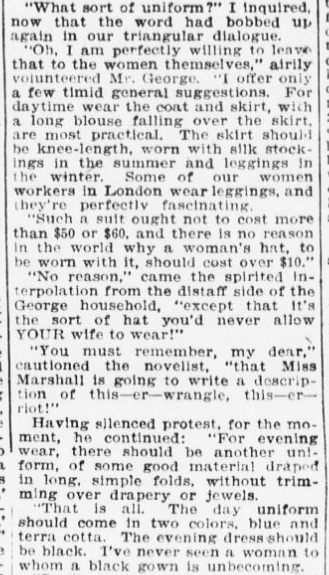
Source.
Posted By: Paul - Fri Nov 02, 2018 -
Comments (1)
Category: Fashion, Literature, 1920s, Women

| Who We Are |
|---|
| Alex Boese Alex is the creator and curator of the Museum of Hoaxes. He's also the author of various weird, non-fiction, science-themed books such as Elephants on Acid and Psychedelic Apes. Paul Di Filippo Paul has been paid to put weird ideas into fictional form for over thirty years, in his career as a noted science fiction writer. He has recently begun blogging on many curious topics with three fellow writers at The Inferior 4+1. Contact Us |




